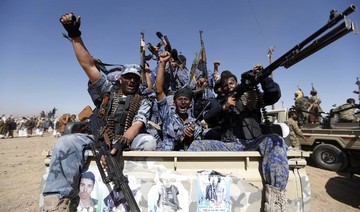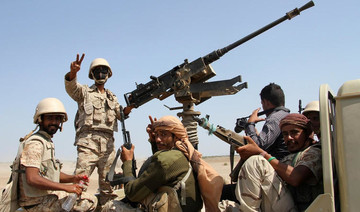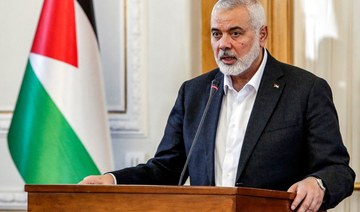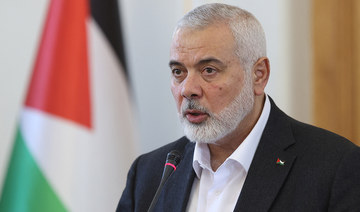JEDDAH: Children recruited as fighters by Iran-backed Houthi militias in Yemen are beaten into submission and face psychological abuse, as well as the risk of death, injury and disability, a former child soldier said on Friday.
Those who try to flee are recaptured and forced to continue fighting, he told the Yemeni Coalition to Monitor Human Rights Violations (YCMHRV).
The child’s testimony is part of a documentary about the recruitment of children in Yemen, which was broadcast during the 38th session of the UN Human Rights Council in Geneva, the Saudi Press Agency (SPA) reported.
Legal expert Lisa Al-Badawi highlighted efforts to rehabilitate former child soldiers and children affected by the war in Yemen.
She said children make up a third of fighters in the Houthi militias, according to a field study by the Wethaq Foundation for Civil Orientation.
The study showed that 80 percent of child soldiers in Yemen begin fighting to earn much-needed money amid deteriorating economic conditions, while just 10 percent join Houthi ranks for “ideological reasons.”
Al-Badawi revealed numerous human rights violations faced by the recruits, including the risk of death and injury, deprivation of education, and exposure to sexual and psychological abuse.
She also discussed the methods used to treat and rehabilitate these children, emphasizing the importance of promoting awareness among parents.
She presented statistics on the areas covered by the rehabilitation process, which is carried out with support from the King Salman Humanitarian Aid and Relief Center (KSRelief).
Dr. Hamdan Al-Shehri, a Saudi political analyst and international relations scholar, said he is not surprised by the Houthis’ large-scale recruitment of children.
“By devious design, they push children onto the frontlines so that when the children become victims, the Houthis can cry foul and blame the legitimate Yemeni government for killing children,” he told Arab News.
“These are terrorist militias, and like all terrorists, they have no qualms about playing with the lives of children.”
It is easy for the militias to brainwash children, Al-Shehri said. “Grown people are difficult to convince, but children become easy prey,” he added.
“In most cases, the Houthis don’t even tell children that they’re going to the frontlines. They lure them by saying they’ll be helping their men.”
Now that the Houthis have been cornered in Hodeidah, they will use children and the civilian population as human shields, Al-Shehri said, asking: “What can we expect from such terrorists?”
Meanwhile, the Houthis have indicated they would be willing to hand over management of Hodeidah port to the UN, according to sources quoted by Reuters. The port is a principal entry point for relief supplies for Yemen.
This week, UN envoy Martin Griffiths has been in the Houthi-controlled Yemeni capital Sanaa and Jeddah, Saudi Arabia, to try to negotiate a solution.
The source, quoted by Reuters, said the Houthis indicated that they would accept overall UN management and inspections of the port.
A Western diplomat said the UN would oversee income from the port and make sure it gets to Yemen’s central bank. The understanding is that Yemeni state employees will work alongside the UN.
Griffiths on Thursday said he was “encouraged by the constructive engagement” of the Houthis, and will be holding meetings with Yemen’s internationally backed President Abed Rabbo Mansour Hadi.
Speaking earlier at the UN, Saudi Ambassador Abdallah Al-Mouallimi reiterated the Saudi-led coalition’s demand that the Houthis quit the city of Hodeidah entirely.
“What we are offering is for the Houthis to hand over their weapons to the government of Yemen and to leave, to leave peacefully, and to provide information about the locations of mines and improvised explosive devices,” he said.
Ex-child soldier presents damning testimony of Houthi recruitment in Yemen
Ex-child soldier presents damning testimony of Houthi recruitment in Yemen
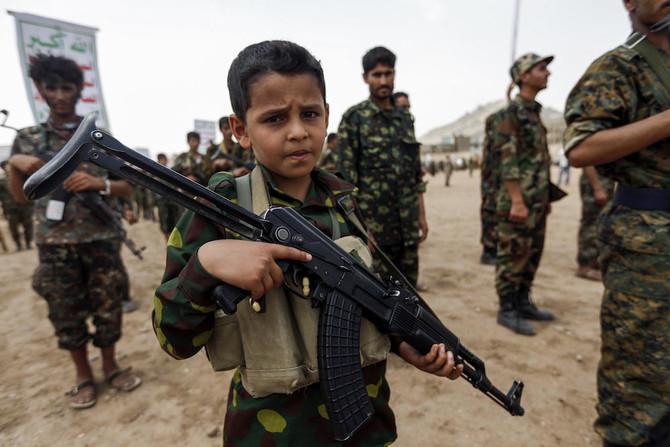
- Children who try to flee are recaptured and forced to continue fighting
- The study shows 80 percent of child soldiers in Yemen begin fighting to earn much-needed money
Hamas chief Haniyeh arrives in Turkiye for talks
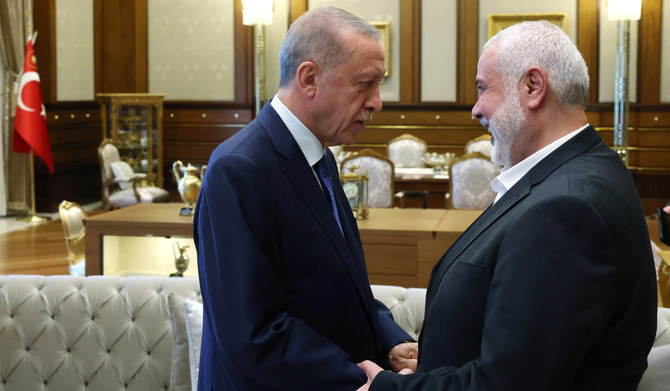
- Fidan said he spoke with Haniyeh, who lives in Qatar, about how Hamas — designated as a terrorist organization by Israel, the United States and the European Union — “must clearly express its expectations, especially about a two-state solution”
ISTANBUL: A leader of Palestinian militant group Hamas, Ismail Haniyeh, arrived in Istanbul Friday evening for talks with Turkish President Recep Tayyip Erdogan as the death toll in Gaza passed 34,000.
A statement from Hamas Friday said Erdogan and Haniyeh would discuss the conflict in Gaza, adding that the head of the group’s political bureau was accompanied by a delegation.
Middle East tensions are at a high after Israel’s reported attack on Iran and Gaza bracing for a new Israeli offensive.
Erdogan insisted on Wednesday that he would continue “to defend the Palestinian struggle and to be the voice of the oppressed Palestinian people.”
But talking to journalists on Friday, he refused to be drawn on the details on the meeting.
Turkish Foreign Minister Hakan Fidan was in Qatar Wednesday and said he spent three hours with Haniyeh and his aides for “a wide exchange of views in particular about negotiations for a ceasefire.”
Qatar, a mediator between Israel and Hamas, acknowledged Wednesday that negotiations to end hostilities in Gaza and liberate hostages were “stalling.”
Fidan said he spoke with Haniyeh, who lives in Qatar, about how Hamas — designated as a terrorist organization by Israel, the United States and the European Union — “must clearly express its expectations, especially about a two-state solution.”
Erdogan’s last meeting with Haniyeh was in July 2023 when Erdogan hosted him and Palestinian president Mahmud Abbas at the presidential palace in Ankara. Haniyeh had last met Fidan in Turkiye on January 2.
The war in Gaza started after Hamas’s unprecedented attack on Israel on October 7 that resulted in the deaths of about 1,170 people, mainly civilians, according to an AFP tally of official Israeli figures.
Militants also took about 250 hostages. Israel says around 129 are believed to be held in Gaza, including 34 presumed dead.
Israel’s retaliatory military campaign has killed at least 34,012 people, mostly women and children, according to Gaza’s Hamas-run health ministry.
Huge blast at military base used by Iraqi Popular Mobilization Forces, sources say

- PMF sources said the strikes targeted a headquarters of the PMF at the Kalso military base near the town of Iskandariya around 50 km south of Baghdad
BAGHDAD: A huge blast rocked a military base used by Iraq’s Popular Mobilization Forces (PMF) to the south of Baghdad late on Friday, two PMF and two security sources told Reuters.
The two security sources said the blast was a result of an unknown airstrike, which happened around midnight Friday.
The two PMF sources pointed out the strikes did not lead to casualties but caused material damage.
PMF sources said the strikes targeted a headquarters of the PMF at the Kalso military base near the town of Iskandariya around 50 km south of Baghdad.
Government officials did not immediately respond to a Reuters request for comment.
The PMF started out as a grouping of armed factions, many close to Iran, that was later recognized as a formal security force by Iraqi authorities.
Factions within the PMF took part in months of rocket and drone attacks on US forces in Iraq amid Israel’s Gaza campaign but ceased to do so in February.
Leaders of Jordan and Pakistan call UAE president to express concern about effects of severe storm

- Leaders passed on their best wishes to the country as it recovers from the storms
DUBAI: The president of the UAE, Sheikh Mohammed bin Zayed Al-Nahyan, received telephone calls from King Abdullah of Jordan and Pakistan’s Prime Minister Shehbaz Sharif on Friday, during which they expressed concern about the effects of the severe weather, including unusually heavy rainfall, that battered parts of the country this week.
They also passed on their best wishes to the country as it recovers from the storms and “conveyed their heartfelt hopes for the safety and prosperity of the UAE and its people, praying for their protection from any harm,” the Emirates News Agency reported.
Sheikh Mohammed thanked both leaders for their warm sentiments, and emphasized the strong bonds between the UAE and their nations.
The UAE and neighboring Oman were hit by unprecedented rainfall and flooding on Tuesday, with more than 250 millimeters of rain falling in parts of the Emirates, considerably more than is normally seen in a year. Dubai International Airport was forced to close temporarily when runways were flooded.
Peshmerga fighter dies in Turkish strike in north Iraq

JEDDAH: A member of the Kurdish Peshmerga security forces was killed on Friday in a Turkish drone strike in the autonomous Kurdistan region of northern Iraq.
Ankara regularly carries out ground and air operations in the region against positions of the outlawed PKK, the Kurdish separatist group that has waged a decades-long insurgency against the Turkish state.
The victim of Friday’s attack died in a drone strike on his vehicle, said Ihsan Chalabi, mayor of the mountainous Sidakan district near Iraq’s borders with Turkiye and Iran.
For decades, Turkiye has operated several dozen military bases in northern Iraq in its war against the PKK, which Ankara and its Western allies consider a terrorist group.
Both Baghdad and the Kurdish regional government have been accused of tolerating Turkiye’s military activities to preserve their close economic ties.
At the beginning of April, a man described as “high-ranking military official” from the PKK was killed in a Turkish drone strike on a car in the mountainous Sinjar region, according to the Kurdistan counterterrorism services.
Turkish President Recep Tayyip Erdogan is expected to visit Baghdad on Monday on his first official visit to Iraq since 2011.
Iraq’s Defense Minister Thabet Al-Abassi in March ruled out joint military operations against the PKK, but said that Turkiye and Iraq would “work to set up a joint intelligence coordination center.”
Middle East in ‘shadow of uncertainty due to regional conflicts’

WASHINGTON: Economies in the Middle East and North Africa face a “shadow of uncertainty” from ongoing tensions in the region, a senior IMF official said.
“We are in a context where the overall outlook is cast into shadows,” Jihad Azour, the International Monetary Fund’s director for the Middle East and Central Asia department, said in an interview in Washington.
“The shadow of uncertainty on the geopolitical side is an important one,” added Azour, a recent candidate for the next Lebanese president.
In the face of the ongoing conflicts in Gaza and Sudan and a recent cut to oil supplies by Gulf countries, the IMF has pared back its growth outlook for the Middle East and North Africa region once again.
FASTFACT
Economic activity in Gaza has ‘come to a standstill’ and the IMF estimates that economic output in the West Bank and Gaza contracted by six percent last year.
The IMF expects growth in MENA of 2.7 percent this year — 0.2 percentage points below its January forecast — before picking up again next year, the IMF said in its regional economic outlook report.
The risks to growth in the MENA region remain heightened, the IMF said, pointing to the danger of greater regional spillovers from the ongoing Israel-Gaza war.
“We have concerns about the immediate and lasting impact of conflict,” Azour said.
The IMF report said that economic activity in Gaza has “come to a standstill” and estimates that economic output in the West Bank and Gaza contracted by 6 percent last year.
The IMF said the report excludes economic projections for the West Bank and Gaza for the next five years “on account of the unusually high degree of uncertainty.”
The IMF cannot lend to the West Bank and Gaza because they are not IMF member countries.
However, Azour said it has provided the Palestinian Authority and the central bank with technical assistance during the current conflict.
“When we move into the reconstruction phase, we will be part of the international community support to the region,” he added.
Azour also discussed the situation in Sudan, where thousands have been killed in a civil war that has also devastated the economy, causing it to contract by almost 20 percent last year, according to the IMF.
“The country is barely functioning, institutions have been dismantled,” he said.
“And for an economy, for a country like Sudan, with all this potential, it’s important to stop the bleeding very quickly and move to a phase of reconstruction,” he added.
The recent Houthi attacks have particularly badly hit the Egyptian economy on Red Sea shipping, which caused trade through the Egypt-run Suez Canal to more than halve — depriving the country of a key source of foreign exchange.
Egypt reached an agreement last month to increase an existing IMF loan package from $3 billion to $8 billion after its central bank hiked interest rates and allowed the pound to plunge by nearly 40 percent.
A key pillar of the current IMF program is the privatization of Egypt’s state-owned enterprises, many of which are owned by or linked to the military.
“This is a priority for Egypt,” Azour said. Egypt needs to have a growing private sector and give space for the private sector to create more jobs.”
“We have an opportunity to re-engineer the state’s role, to give the state more responsibility as an enabler and less as a competitor,” he said.


